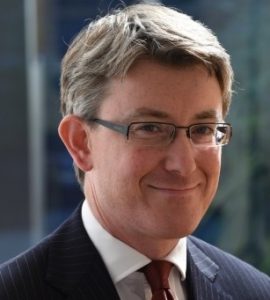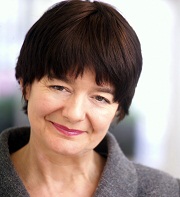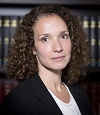Brian Kennelly QC – Blackstone Chambers, London
 Brian Kennelly QC was one of 107 advocates appointed silk earlier this year at the ceremony in Westminster Hall. We met at Brian’s London Blackstone Chambers where Brian specialises in EU and Competition, Public Law and Human Rights, Commercial and Sport.
Brian Kennelly QC was one of 107 advocates appointed silk earlier this year at the ceremony in Westminster Hall. We met at Brian’s London Blackstone Chambers where Brian specialises in EU and Competition, Public Law and Human Rights, Commercial and Sport.
Brian conveys a genuine fascination for Competition Law, a subject on which he is a greatly in-demand expert, Chambers (2016) describing him (pre silk) as “a fantastic junior; what he doesn’t know about competition law is probably not worth knowing.” He talks with passion about the European political and legal structures, an interest that stems back to his university studies at Cambridge and Brussels. He says that he had always been interested in history and became fascinated by the idea of nation states agreeing to pool some sovereignty to create a common legal system at European level which in turn is implemented in national legal systems. Our conversation at one point touches on the Common Agricultural Policy and the repercussions for the UK (and Ireland, where Brian is from) of a vote to withdraw from the EU.
We talked about how Brian came to make his decision to apply for silk. He said that there were a number of linked ‘spurs’ to applying for silk: his solicitor clients had been urging him to apply for some while, suggesting that as a Queen’s Counsel he would be in even more demand for cases of the sorts which Brian found particularly demanding and satisfying where he was leading juniors, increasingly against existing silks; and a desire to do more of his own advocacy.
As to preparing for the application, Brian took on more cases that provided opportunities for oral advocacy and as leader of teams of juniors and solicitors, as these were the two area where he considered that he needed to gather more evidence for the Panel in order to be able to satisfy the competencies at a level of excellence. At the same time, Brian sought a broader range of cases. He recommends that would-be applicants begin thinking very early on about the sorts of cases they need to have under their belt within the two (or, if necessary) three year period.
When it came to preparing for the interview, Brian said that he had a mock interview with a trainer outside the legal profession because he was interested in gaining some of the broader skills that would help him in a competency-based interview. When it came to talking about his specialism and the law, Brian felt that the QC Panel interviewers would be looking for him to explain his cases in a succinct and easily-understandable way, as you would do for the Judge. As to his experience of the interview itself, Brian said that he found this to be “interesting and strange” – not at all like anything he had encountered in his chambers and court experience.
We next spoke about the work Brian was involved with for Big Voice London which is a youth organisation supported by but independent from the Supreme Court which aims to seek to empower young people from disadvantaged backgrounds, predominantly aged 16-18, through knowledge of the law and legal policy to have access to the legal profession as a career, by exploring law as a potential vocation. Big Voice has worked with hundreds of students from many different non-fee paying schools. They do not require applicants to meet any grade threshold. Big Voice runs projects and activities such as Judgment Writing Competition. (see http://www.bigvoicelondon.co.uk/)
Brian said it was vital that young people were aware that the legal profession was something they could aspire to so long as they understood that this would involve a great and sustained effort to produce high-quality work through A levels, university and bar school. Brian encouraged young people to make every single piece of academic work or outside activity (e.g. voluntary work) the best they possibly could, because every achievement would count towards achieving their ambition. They also needed to look out for any potential opportunities such as work experience and scholarships. No opportunity could be lost in gaining the edge that they would need to be successful in the fearsome competition for pupillages. Contrary to some received wisdom, Brian considered that young people from less privileged social and educational backgrounds, who aspired to the bar, would gain more from studying drama than joining debating societies. This experience could give them the confidence to stand-up and speak in public, the sort of confidence which those who attended fee-paying schools seemed “to have in bags”.
So how did he find the QC application process overall? Brian said he was very impressed by the structure and professionalism of the Competition, which he found to be very slick – he found the Secretariat ready and willing to quickly deal with the specific queries he had. Brian said that for future applicants it was vital to become thoroughly familiar with the Guidance for Applicants because “practically all you need is all in there”.
As to the silk ceremony, Brian said that this was a wonderful experience – he had his immediate family and the extended family over from Dublin to share in his achievement and the ensuing celebrations. Brian said that without the support of his parents, especially his mother and his wife and three children, none of what he has achieved would have been possible.
© Queen’s Counsel Appointments Ltd
- Date: March 25, 2019
- Category: QCA Profiles 2016


